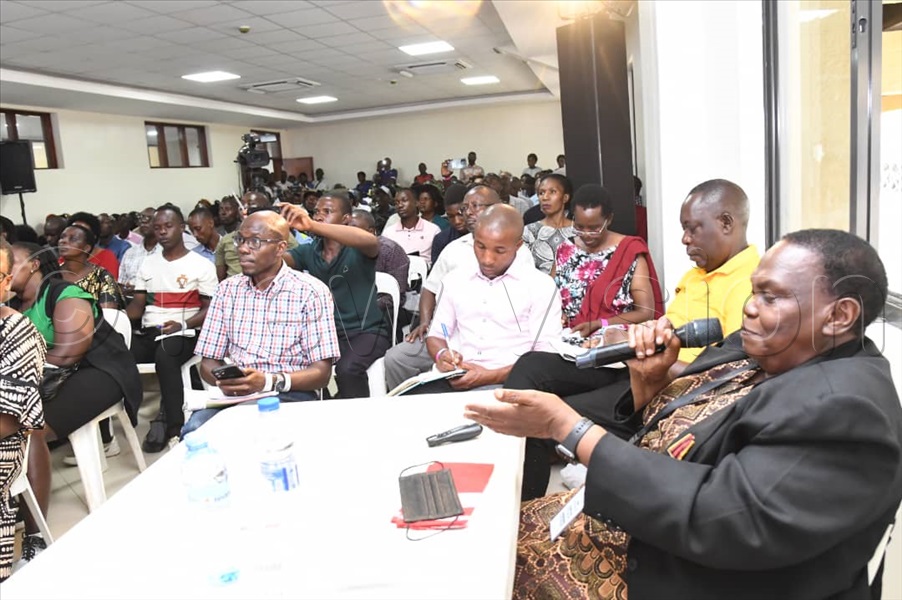Cattle farmers sorted on management, disease prevention
Farmers who keep detailed records are better equipped to manage their herds effectively. A solid record system helps you track your progress, identify issues early, and set goals for the future," he explained.
“Before starting any breeding programme, it is vital to ensure that cows are free from these diseases. If one is using a bull, regular health checks are a must,” Kizito advised farmers. (Credit: Eddie Ssejjoba)
By Richard Ategeka
KAMPALA - Farmers seeking to optimise cattle breeding and improve herd health got a lease of life when they attended the ninth edition of the Harvest Money Expo 2025, which Vision Group organized under the theme; Farming as a Business, Value Addition and Cooperatives.
With challenges in breeding, disease control, and genetics top on the list, veterinary experts like Mugimba Kizito, at URUS (a holding company with cooperative and private ownership with strong roots in the global agriculture) say diseases like brucellosis, campylobacteriosis, and trichomoniasis are the most significant threats to cattle breeding.
Geoffrey Mukama, technical manager Koudjis interacts with farmers on dairy cattle nutrition. (Credit: All photos by Eddie Ssejjoba)
These diseases, often sexually transmitted, can wreak havoc on a farm’s breeding cycle. Once infected, cows remain carriers for life, continually spreading the bacteria.
“Before starting any breeding programme, it is vital to ensure that cows are free from these diseases. If one is using a bull, regular health checks are a must,” he advises.

Dr. Jolly Kabirizi, Best Farmer 2020 and animal scientist making a presentation during a dairy cattle zero grazing training session.
Kizito added that brucellosis, in particular, is a serious concern because it can be transmitted to humans, leading to Amarata fever, a dangerous condition. He urged farmers to regularly vaccinate their herds and maintain clean environments to avoid contamination.
Management and nutrition matter
Along with disease prevention, proper management is essential. Kizito stresses the importance of monitoring the cows’ reproductive cycles, ensuring that they are fed a balanced diet, and providing the right minerals like zinc and copper to promote egg quality.

“A cow's nutrition directly impacts her fertility,” he notes.
He adds that farmers also need to pay attention to hygiene, particularly during labour, saying cows should be assisted in clean, prepared maternity areas, not in dirty environments, as this can introduce infections.
Additionally, heat stress can lead to complications such as swollen ovaries, so farmers must manage their cows’ exposure to extreme temperatures.

When it comes to genetics, Kizito advocates for farmers to focus on breeding cows with a proven history of good reproduction.
"Cows should be selected based on their ability to conceive regularly. Record keeping is crucial—knowing your cows’ history allows you to make informed decisions and eliminate poor performers," he advises.
Farmers who keep detailed records are better equipped to manage their herds effectively. A solid record system helps you track your progress, identify issues early, and set goals for the future," he explained.

Bruno Mwanje, a cattle farmer from Mpigi said the advice and information he got from different exhibitors will help him take better care of his cows.
“I have learned a lot about how to improve my herd’s fertility and prevent diseases,’’ he said. Annet Karungi, another expo attendee from Mutundwe said the expo is a platform for them to master skills before they start farming practices.
“The information one gets here is enough for us to decide on what we can do perfectly,’’ she said.
Running from February 14-16, the event was sponsored by Engsol, Abi, Tunga Nutrition, UDC, Pepsi, and Bella wines in partnership with New Vision and the Kingdom of the Netherlands.